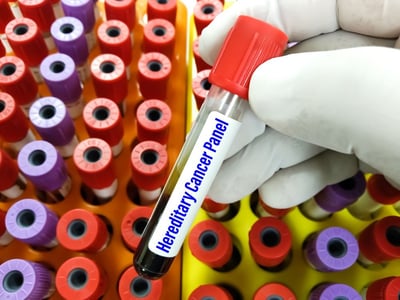Prostate Cancer



Relevance: High
Most relevant for: People diagnosed with cancer who have not yet had genetic testing
Study: Genetic testing among people with cancer can find mutations that may affect treatment and prevention
Despite national guidelines recommending genetic testing, less than 10 percent of eligible patients had genetic testing within two years after their cancer diagnosis. Among those who had testing, 10-30 percent had an inherited mutation that could affect their medical care. (Posted 3/15/2024)
Este artículo está disponible en español.
READ MORE ›


Relevance: Medium-High
Most relevant for: People diagnosed with advanced prostate cancer
Study: Genes linked to aggressive prostate cancer
Previous research has linked some inherited mutations to prostate cancer risk. This study found a link to additional genes that should be added to prostate cancer gene panel tests. The study also looked at which genes were most closely linked to aggressive prostate cancer that is more likely to spread. (Posted 2/1/24)
Este artículo está disponible en español.
READ MORE ›


Relevance: Medium-High
Most relevant for: People with metastatic castration resistant prostate cancer with a mutation in BRCA1 or BRCA2
Update: New drug combination approved for treatment of BRCA-mutated metastatic prostate cancer
The FDA approved Akeega (niraparib and abiraterone) plus prednisone for the treatment of BRCA-mutated, metastatic castration-resistant prostate cancer (mCRPC). Akeega can be used as an early or later treatment. (Posted 11/9/23)
Este artículo está disponible en español.
READ MORE ›


Relevance: Medium-High
Most relevant for: People with metastatic castration resistant prostate cancer who have an inherited or tumor mutation in certain genes.
Update: New first-line treatment option for metastatic prostate cancer
The FDA has approved Talzenna (talazoparib) with Xtandi (enzalutamide) as first-line treatments for some patients with metastatic castration-resistant prostate cancer. (Posted 10/2/23)
Este artículo está disponible en español.
READ MORE ›


Relevance: High
Most relevant for: People interested in genetic testing.
Article: Genetic testing and the future of medicine
An article published in Katie Couric Media discusses genetic testing and how it can impact health. The author talked with Dr. Robert Steiner, a doctor who specializes in genetics. He talked about genetic testing and how the results can affect health and change lives. (Posted 9/28/23)
Este artículo está disponible en español.
READ MORE ›


Relevance: Medium-High
Most relevant for: Gay and bisexual men diagnosed with prostate cancer
Topic: Sexual health concerns of gay and bisexual men with prostate cancer
Prostate cancer therapy can affect gay and bisexual men differently than heterosexual men. Many urologists do not routinely address these unique concerns. Selecting providers who understand the concerns that are unique to gay and bisexual patients and asking questions about sexual health concerns may improve these patients' healthcare experiences. (Posted 9/21/23)
Este artículo está disponible en español.
READ MORE ›


Relevance: Medium-High
Most relevant for: People with metastatic castration resistant prostate cancer with a mutation in BRCA1 or BRCA2
Update: New drug combination for early treatment of some metastatic prostate cancer
The FDA approved Lynparza (olaparib) for use earlier in treatment of metastatic castration-resistant prostate cancer (mCRPC) when added to abiraterone and prednisone for people with a BRCA mutation found through genetic or tumor testing. Lynparza combined with hormone therapy may now be used as a first-line or later treatment. (Posted 9/11/23)
Este artículo está disponible en español.
READ MORE ›


Relevance: Medium-Low
Most relevant for: People with solid tumors.
Article: Promising drug for cancer treatment begins clinical trials
Researchers at City of Hope are testing a new type of cancer treatment drug. When tested in animals and cells taken from human cancers, this new drug prevented the growth of many types of cancer. Initial clinical trials in people have just started. (Posted 9/7/23)
Este artículo está disponible en español.
READ MORE ›


Relevance: Medium-High
Most relevant for: People with metastatic castration-resistant prostate cancer (mCRPC)
Study: Promising early results for treating metastatic prostate cancer
The TALAPRO studies looked at how well the oral drug Talzenna (talazoparib) works as a treatment for metastatic castration-resistant prostate cancer (mCRPC). The addition of Talzenna to treatment with Xtandi (enzalutamide) increased the time until the cancer got worse or came back (progression-free survival). The greatest benefit was seen in people who had an inherited or tumor mutation in a gene that repairs DNA damage (such as ATM, BRCA1, BRCA2 and others). (Posted 3/1/23)
Update: On June 20, 2023, the Food and Drug Administration (FDA) approved the combination of Talzenna with Xtandi as an initial treatment for some people with mCRPC for people with inherited or tumor mutations in genes that repair DNA damage.
Este artículo está disponible en español.
READ MORE ›


Relevance: Medium
Most relevant for: People interested in reducing cancer risk
Study: Increasing soy in your diet may lower your cancer risk
This study looked at a link between a diet rich in soy and cancer risk. With the addition of more recent literature, this study suggests that soy lowers the risk of cancer in the general population. (Posted 2/24/23)
Este artículo está disponible en español.
READ MORE ›